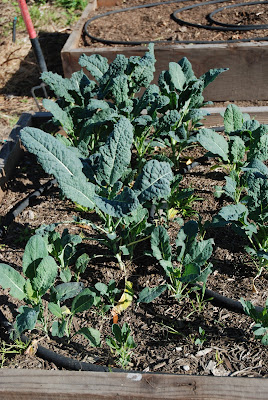The first time I got bees, I believe they swarmed out of the neighbor's walnut tree:

And for vocabulary purposes, this is a screened bottom box. It allows varroa mites to fall out of the hive, and provides for good ventilation. The bees keep plenty warm, and airflow is a plus for hive health. One end is open, so the bees come and go through that into the deep hive body.

The bottom boxes are about 9" tall, and they are called, appropriately enough, "deeps." Inside each are ten frames of plastic foundation in a wooden frame, running front to back. They hang down like file folders, and the bees draw out comb on the foundation and move within the hive. The babies are raised in the bottom part, in a roughly ball-shaped nest.

In my case, the yellow top short boxes are about 6 1/2" deep, and they're called supers (because they go above the deeps), and the extra stores of honey go in there. Some beekeepers put "queen excluders" between the deeps and supers, so that no babies can be laid in the top. I personally don't care, and if the hive is managed well, the bees keep their babies downstairs. Some keepers use only mediums, with three making up a large nest area, because they're just easier to lift than a full deep. Bees and honey are heavy.

The boomer hive is still pretty great, even with the nonsense we'd perpetrated on it last week. Tomorrow is the day to see if our attempted queen rearing worked so far.
So, enough anatomizing the bees, on to the rest of the parts of the garden.
The new babies awaiting transplanting -- tomatoes, tomatillos, peppers, and a couple of cucumbers.

The red kale is in full bolt, unfortunately. I was hoping to eat a lot more of that, and I'm not sure that it's going to taste good any more.

My nemeses are still around -- fortunately I barely care about chard at this point:

The lacinato kale has decided to join the bolting club, before it even got big enough. I thought I was going to have to leave it in the bed, but now I think it's going to be dinner very very soon.

Almost ready to plant, although the bees are giving me a bit of trouble when I'm out there, and Heiko, I'm going to plant potatoes AND tomatoes at the same time. Don't tell your neighbors.

I hope it works!

The bees must have gotten to the apricots, because they're about as big as a chicken's brain.

Teensy plums, too.

Anyhow, I know I tend to throw everything into a post, but hopefully when I blather about bees it will make sense from now on.

9 comments:
I've always wondered what the term "super" meant. Can't ya tell that I know very little about beekeeping? Thanks to you, i'm learnin' though!
Your apricots are huge, while our blossom has only just come out... you're very far ahead of us!
The word lesson helped a lot. I've read a lot of bee posts from people, but never had the terms defined before.
I love learning about the bee keeping. My folks kept bees when I was very very small - but unfortunately I was too small to understand much about it and they kept me well away from the bee hives so I never got to watch either.
EG, Latin will help you all over.
Jan, it's a fluke of climate, of course. I'm wondering if any of them will stay.
Daphne, it's all basic if you're doing it, but I forget that not everyone is steeped in this.
kitsapFG, that's great. I wonder what my kids will remember (if anything).
Those biennials just want to do what comes naturally in the spring . . . Your chard may go that way soon also. Did you take up bee keeping on your own or did you (do you) have a mentor?
Weeellll, if I'd say anything to my neighbours, it would just confirm all their suspicions about these strange foreign ways. What good could come from a country that wasn't around 5 minutes ago. And as for NOT liking bietola??? You'd be exiled during the main festa of the year in our village, the Sagra della Scherpada, our village's take on the famous torta di verdura.
I really like eating the flower heads of kale. Sometimes the lower part needs to be peeled, but in general, I've found kale blossoms even sweeter than broccoli. So, bolting isn't the worst thing in the world.
Once again, fascinating bee info.
Love those taters!!!
Got some honey questions - hope you don't mind me asking you...
We used to buy organic honey at the grocery store, but it got so pricey so the hubby has been buying a big 3 lb bottle of regular honey at a wholesale shop for $5. It's not as good... but...
So I just found out that I can get "raw local honey" for $12/quart/3 lbs . I don't know anything about the seller, other than it's via a veggie co-op. Other than the obvious benefit of buying local, are there benefits to us buying the local honey? I think I read somewhere to always buy organic (or local) honey since mass-produced honey is done by killing off the hive or something? Am I right in this?
So just wondered your take on it all since you're the only bee expert I know!
Thanks!
Post a Comment